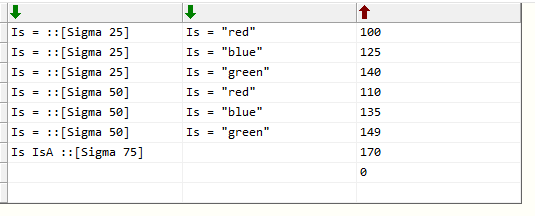The CheckByParam attribute function checks a decision table outside the default rule check. The function can be called for bound and unbound decision tables.
|
Syntax | |||||
|
CheckByParam(ByRef InValues(), ByRef OutValues()) | |||||
|
Return value | |||||
|
Type |
Description | ||||
|
Boolean |
True if the check has found a hit in the table. | ||||
|
Parameter | |||||
|
Use |
Name |
Type |
Passing |
Description | |
|
Required |
InValues() |
Variant |
ByRef |
Values for the inbound columns of the decision table. The zero index represents the check value of the first input column. Other ascending indexes correspond to the other input columns. | |
|
Required |
OutValues() |
Variant |
ByRef |
Variant list that records the values of the output columns if a row hit is found for the input columns. The zero index represents the value of the field of the first output column. Other ascending indexes correspond to the fields of the other output columns. | |
Example:
There is a decision table DT_Price in a class:

The DT_Price decision table has two input columns and one output column.
The check is performed by the input values for class name and color.
The output is returning the price for each combination of the possible input values.
Dim Res() As Variant
If DT_Price.CheckByParam({Class, Color}, Res) = False Then
Preis := 0
Else
Preis := Res(0)
End If